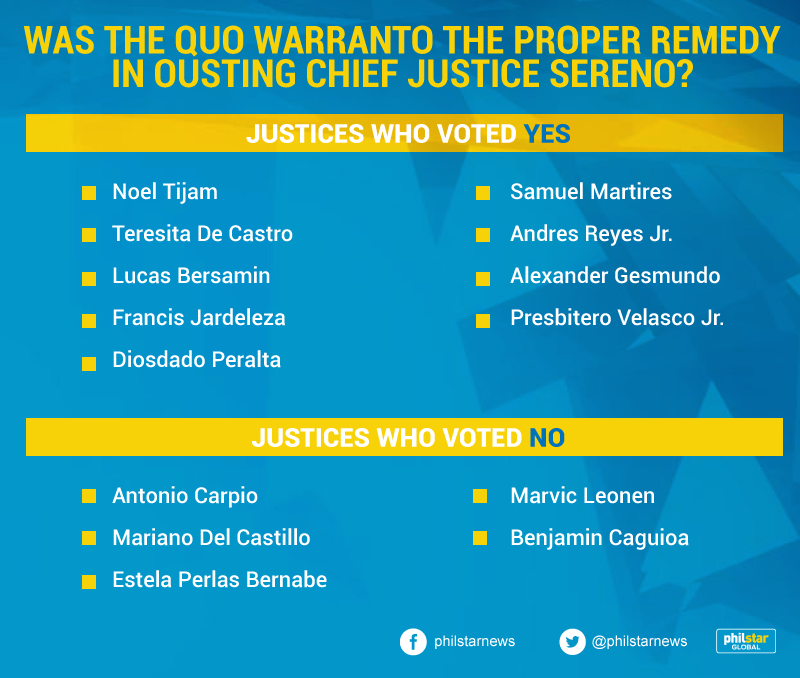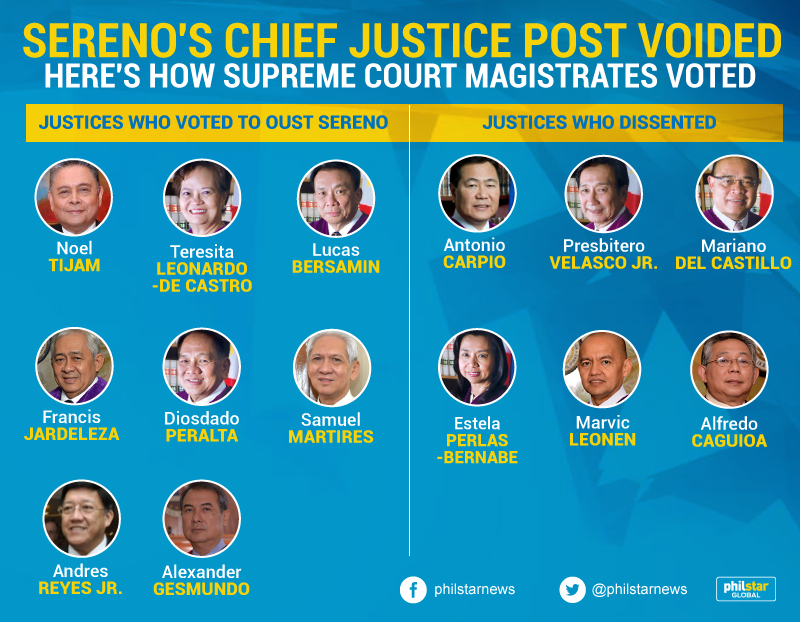The cards are stacked against Sereno but she may have an ace up her sleeve

MANILA, Philippines (First published May 12 at 6:36 p.m.) — In an unprecedented move, the Supreme Court on Friday voted to nullify the appointment of Chief Justice Maria Lourdes Sereno, whom President Rodrigo Duterte branded as his “enemy.”
Voting 8-6 in a special en banc session, the high tribunal only took two months to decide on Solicitor General Jose Calida's quo warranto petition, which challenged the legality of Sereno's appointment mainly on the grounds of missing wealth declarations.
In a rare display of unity, majority and minority lawmakers strongly decried the SC’s decision.
READ: How the quo warranto petition vs Sereno could affect the judiciary
Some political watchers say the landmark ruling paves the way for a constitutional crisis, wherein the high court has assumed a function the fundamental law grants solely to Congress—to oust the chief justice through impeachment proceedings.
They have also noted that the SC, through its decision, handed tremendous powers to the solicitor general—to be able to remove an impeachable official through a quo warranto petition.
What lawmakers say
Voting 33-1, the House of Representatives’ committee on justice approved last March its report finding probable cause to unseat Sereno, as detailed in six articles of impeachment that were being readied for plenary approval and possible transmittal to the Senate.
The date SC released its decision, May 11, was crucial as it was days before Congress resumes session on May 15, when lawmakers are expected to vote on the articles of impeachment. Originally, the justices were supposed to hold a special session to decide on the quo warranto petition on May 17.
Senate President Aquilino Pimentel III said last month that should the SC oust Sereno, they could still proceed with the impeachment trial, if a majority of senators agree, and tackle whether removal through a quo warranto petition was invalid. Nine justices of the high court said it was the proper remedy.

Pimentel, however, said this scenario could only happen if the articles of impeachment are already in the hands of the Senate. The high court’s vote to unseat the chief justice ahead of Congress’ opening of sessions seemed to have removed this option.
It also took away the opportunity for Sereno to prove her case before the Senate impeachment court.
Ahead of the verdict, House committee on justice head Rep. Reynaldo Umali said he might recommend that the impeachment complaint against Sereno “be archived” if there’s an “overwhelming vote” favoring the solicitor general’s ouster plea.
But Umali stressed that “if there is a close vote in favor, we will play it by ear.”
Separately, Majority Leader Rodolfo Fariñas on Friday said the House would no longer transmit the impeachment complaint against Sereno to the Senate for trial unless the SC ruling is reversed.
Glimmer of hope?
Shortly after the announcement of the ruling, Sereno’s camp said they would seek its reversal by filing a motion for reconsideration, or MR.
According to Integrated Bar of the Philippines President Abdiel Fajardo, the lower house may still submit the articles of impeachment to the Senate because the high court’s decision is not yet final and can still be overturned.

“In that sense, the chief justice is still employed as such and may still be removed by conviction in the Senate,” Fajardo explained in a phone interview on Saturday.
“Once the articles are there, the Senate—being the sole judge in impeachment trials—may take the view that the statement of assets, liabilities, and net worth violation is an impeachable offense that it will hear to the exclusion of any other government body, including the SC,” Fajardo added.
Narrow window
However, the IBP chief said the House might decide not to transmit the articles of impeachment to the upper chamber since the SC’s decision is immediately executory without the need for further action from the court.
“Immediately executory means she (Sereno) is no longer chief justice. She can only be reinstated if she wins the MR,” Fajardo said.
To score a victory, the chief justice must get two of the magistrates who voted for her ouster to rethink their decision.

“The House may take the narrow view that since the decision says that it is immediately executory, there is no more impeachable officer to remove and that therefore the impeachment will have to be set aside for being moot,” he added.
An insider source of The STAR says the decision on Chief Justice Maria Lourdes Sereno's quo warranto was already signed by seven justices ahead of this morning's special en banc session.
Court observers said that based on the April 10 oral arguments on the quo warranto petition against Sereno, it seemed that majority of the justices were inclined to vote for the removal of the head magistrate.
READ: How the quo warranto petition vs Sereno could affect the judiciary
— with Edu Punay
Former Supreme Court spokesperson Theodore Te says there could have been other methods in resolving the matter when asked if the high court made a mistake in removing the chief justice through a quo warranto petition.
"I think most of the matters that went on... there were some personal animus that was going on between them. Where I'm coming from is that perhaps that personal animus could have been resolved, and that doesn't mean only on one side it meant on all sides, because many of these are family matters in a sense. Internal matters that could have been resolved and it was very difficult for me because I could see that," Te says in an interview over ANC's "Early Edition."
"The decisions of the court become the law of the land that's what we always say. That's a judgment that's there. I don't know if I would call it a mistake but I would definitely say that in creating that precedent, that loophole, even though it is a once in a lifetime loophole, I think the court could have restrained itself," he adds.
The Supreme Court directs Solicitor General Jose Calida to comment on the appeal filed by ousted Chief Justice Maria Lourdes Sereno on the quo warranto ruling.
The high tribunal gives Calida a non-extendible period of five days to file his comment on Sereno’s motion for reconsideration.
Ousted Chief Justice Maria Lourdes Sereno files an appeal on the Supreme Court ruling on May 11 that granted Solicitor General Jose Calida’s quo warranto petition against her.
In a vote of 8-6, her colleagues at the SC voided her appointment as chief justice in 2012.
"Respondent [Sereno] is found disqualified from and is hereby adjudged guilty of unlawfully holding and exercising the Office of the Chief Justice. Accordingly, Sereno is ousted and excluded therefrom," the historic decision reads.
Those who voted in favor of the ouster were Associate Justices Noel Tijam, Teresita De Castro, Lucas Bersamin, Francis Jardeleza, Samuel Martires, Andres Reyes Jr. and Alexander Gesmundo. -
A group of justices and employees of the Supreme Court expresses support for the high court after its decision to oust Sereno as chief justice.
READ: Statement of support from judges, court personnel for Supreme Court after its decision ousting CJ Sereno @PhilippineStar pic.twitter.com/Iqnz4LgtZo
— Edu Punay (@edupunay) May 21, 2018
The Senate will take up today a resolution signed by 14 of its members seeking a review of the high court's decision to remove an impeachable official via a quo warranto.
READ: The cards are stacked against Sereno but she may have an ace up her sleeve
The Coalition for Justice urges the Senate to take a collective stand against the Supreme Court decision ousting Chief Justice Maria Lourdes Sereno by asserting its exclusive right to remove impeachable officials.
“We respectfully ask you to remind the Supreme Court that the Senate's sole power over impeachable officers must not be impugned by a co-equal branch of government,” the CFJ says in an open letter to senators.
“If the Decision remains unchallenged and the Senate's duty is unperformed, the dire fallout on our system and people will lie at the Senate's door,” it warns.
- Latest
- Trending


























